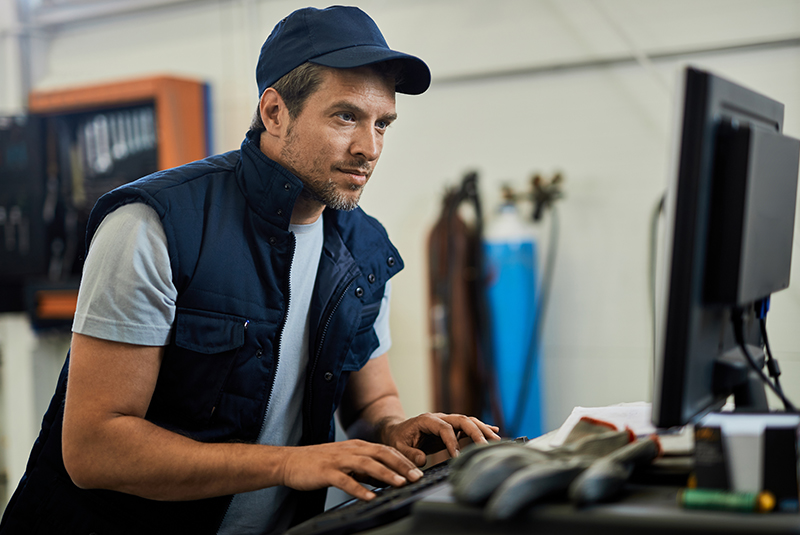The automotive industry, particularly the collision repair sector, is undergoing important changes due to the challenges it’s facing. Body shops and repair centers are increasingly seeking out to find new strategies to adapt to the current industry landscape while maintaining a healthy financial balance and exceptional customer service. One of the first go-tos they are pursuing is embracing technology and digital tools that can help expedite the shop’s tasks for faster vehicle intake and inspection.
These innovations are not just enhancing efficiency but are fundamentally reshaping how managers and staff approach vehicle claims and repair processes. From simplifying complex claims to improving customer experience, the impact of AI is proving to be profound and far-reaching.
Streamlining the Drive-In Process
In the world of collision repair, the claims cycle can often be a cumbersome process, leading to delays and frustration for all parties involved. However, AI and machine learning are stepping in to revolutionize this experience. With these technologies, insurers, repairers, and consumers can expect:
Accurate, Consistent, and Fast Estimates: Automated systems provide reliable pre-estimates in minutes, significantly reducing the time it takes for claims to be processed and quotes to be delivered to stakeholders. This is crucial in collision repair, where time is of the essence. That’s where expertise comes in to validate and sign off on a reviewed estimate.
Increased Triage Accuracy: AI enhances the triage process, ensuring that claims are assessed more accurately and efficiently. This means fewer errors and a more streamlined workflow for collision repair shops. Once a vehicle is deemed a Total Loss from photo-based identification, insurers can save on towing expenses and shops can save on floor space, not having to redirect Total Loss units to salvage yards but instead setting the correct destination right from the start. Needless to say, the fewer trips, the lower the carbon emissions.
Integrated Parts Management: Automation in parts sourcing procedures speeds up repairs and reduces the administrative burden on all parties involved, allowing body shops to focus on getting their customers back on the road rather than chasing parts quotes on the phone line. AI systems today are allowing businesses to streamline the parts ordering process, ensuring that shops have the necessary components on hand when they need them.
Addressing Challenges in the Collision Repair Landscape
The collision repair industry faces numerous challenges, including labor shortages, rising parts costs, and increasingly complex vehicle technologies. AI and machine learning can help mitigate these issues by providing solutions that enhance productivity and efficiency.
For instance, the ability to generate accurate estimates rapidly allows collision repair shops to allocate resources more effectively, ensuring that skilled technicians are available when and where they are needed. Furthermore, AI can assist in training new employees by providing real-time guidance and support, helping to bridge the skills gap in the industry.
The Human-in-the-Loop Approach
At the heart of effective AI implementation in the automotive sector is the “human-in-the-loop” approach. This methodology prioritizes human-computer interaction and is designed to create smarter systems that benefit from meaningful human involvement. In the collision repair industry, this is not just good practice, it is a necessity.
AI and machine learning systems always incorporate the human component that can intervene when necessary. Whether it’s flagging an issue in the claims cycle or overriding a self-driving vehicle, human expertise is crucial.
At Solera, we are committed to developing innovating solutions that empower humans to work with simplified processes. Our approach combines advanced technology with human expertise, what we refer to as Bionic Workforce. This synergy creates an unparalleled blend of human insight and technological capabilities.
A True Partnership of Human Expertise and Technology
The “human-in-the-loop” concept is not merely a checkbox; it represents a fundamental principle of our operations at Solera. Our team’s extensive collective experience in the automotive industry enables us to understand how intelligent designs function in real-world settings, ensuring that the output is not only valid but also meaningful.
The integration of AI and machine learning in the collision repair industry is about automation and enhancing human capability while addressing the unique challenges faced by body shops today. By combining advanced technology with human expertise, we are paving the way for a more efficient, safer, and customer-focused collision repair landscape.
As we continue to innovate, strong partnerships will remain at the forefront of our mission to redefine the future of vehicle lifecycle management. This collaboration not only streamlines processes but also ensures that shops can thrive in an increasingly complex environment, ultimately leading to improved outcomes for consumers and businesses alike.
Interested to learn more? Fill out the form below and our Collision Experts will connect with you.

